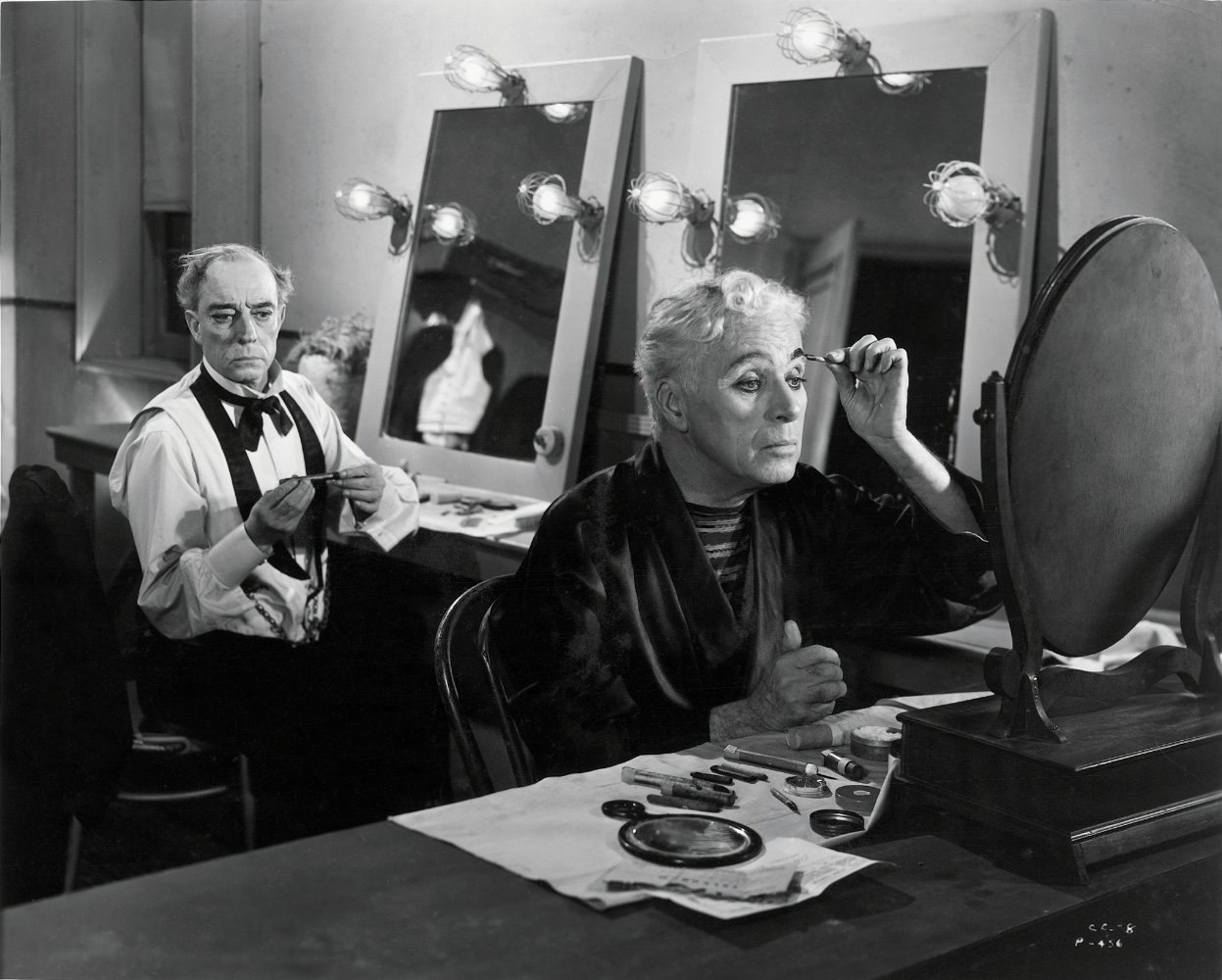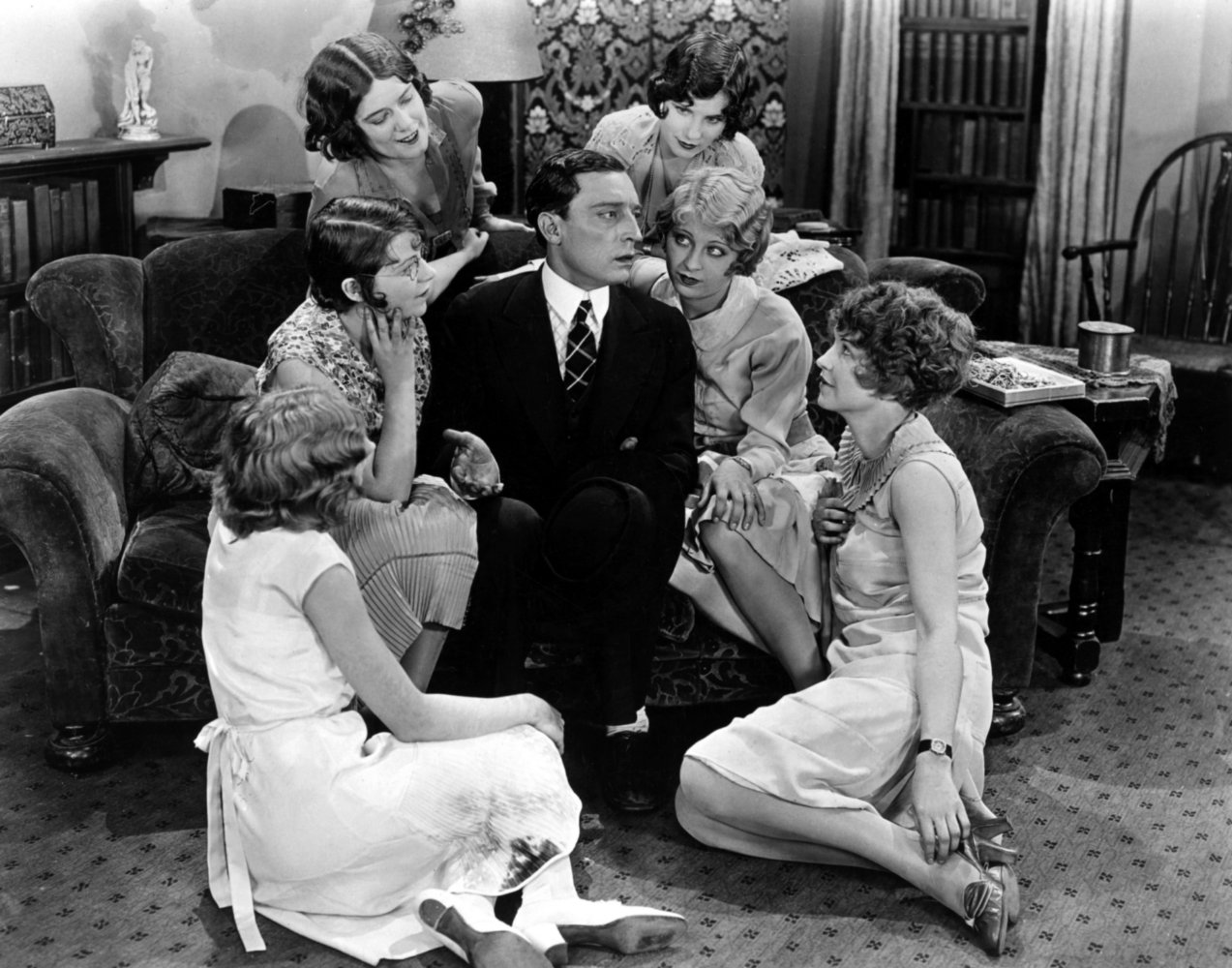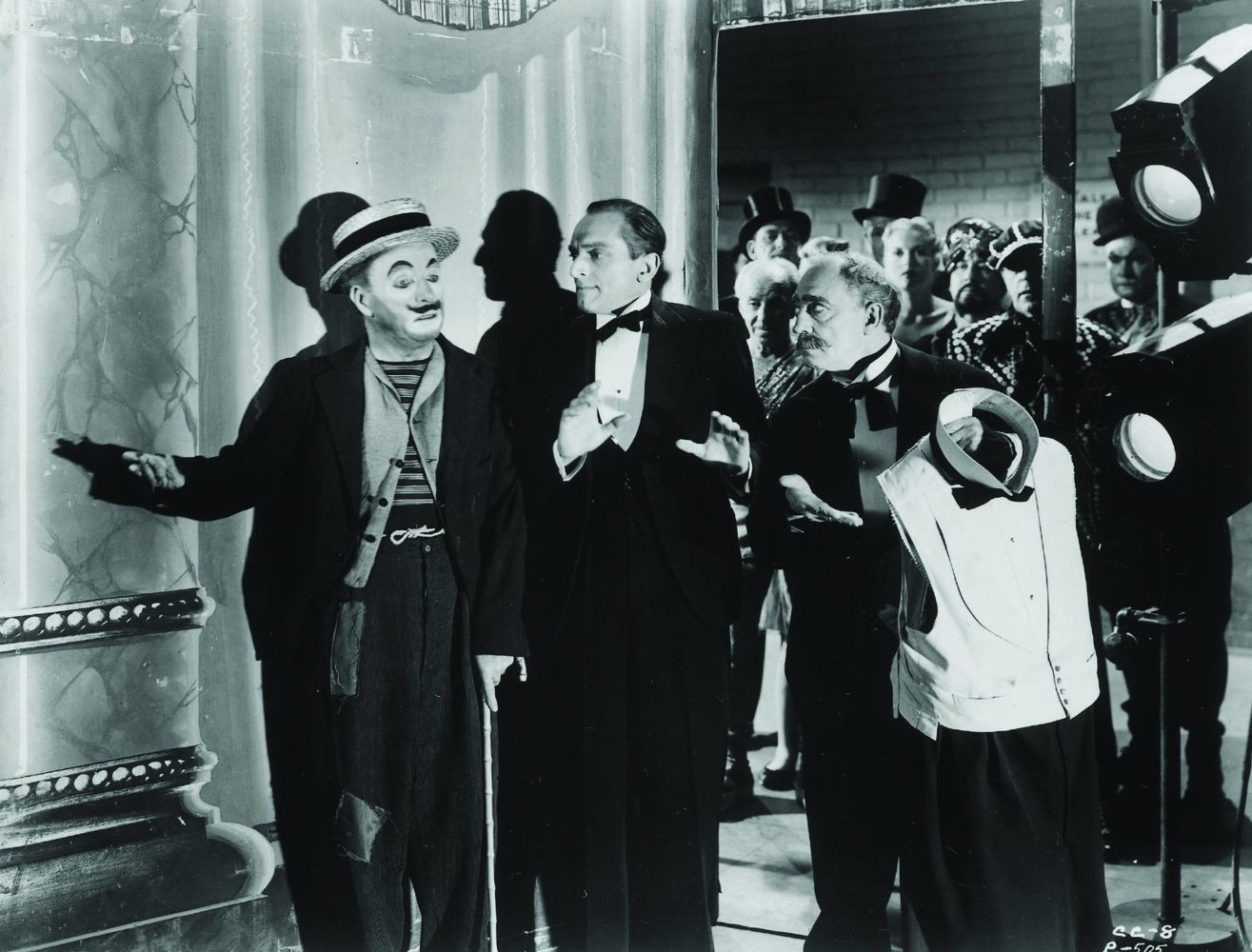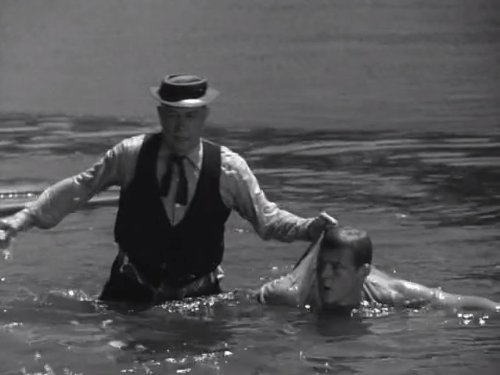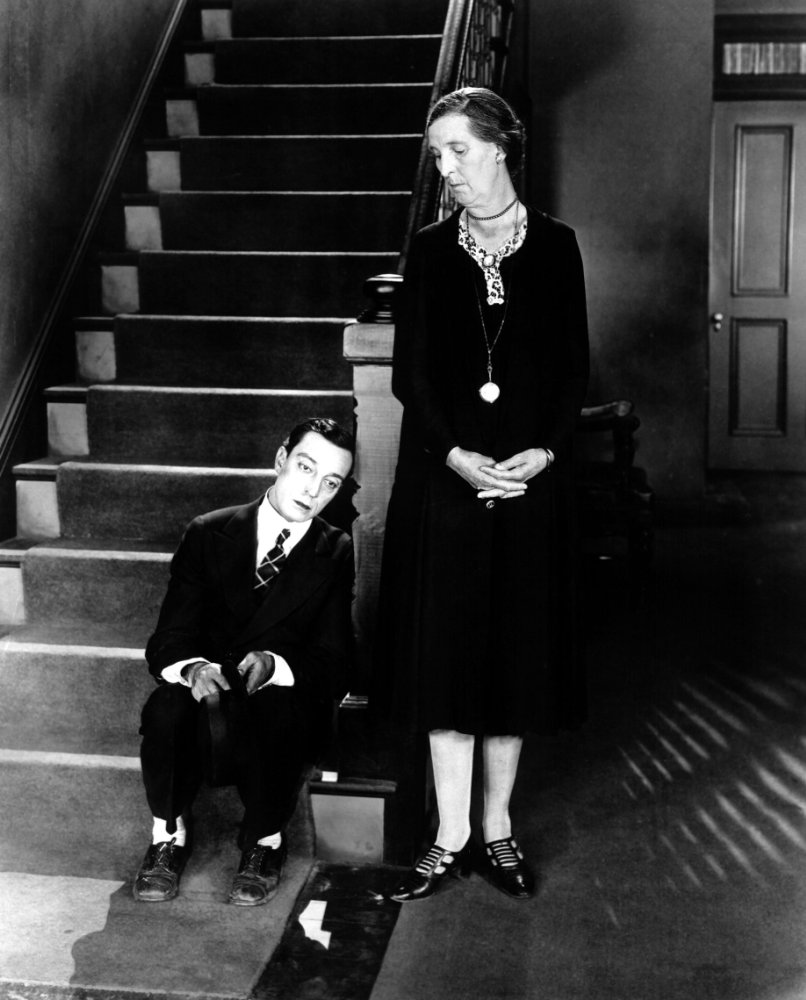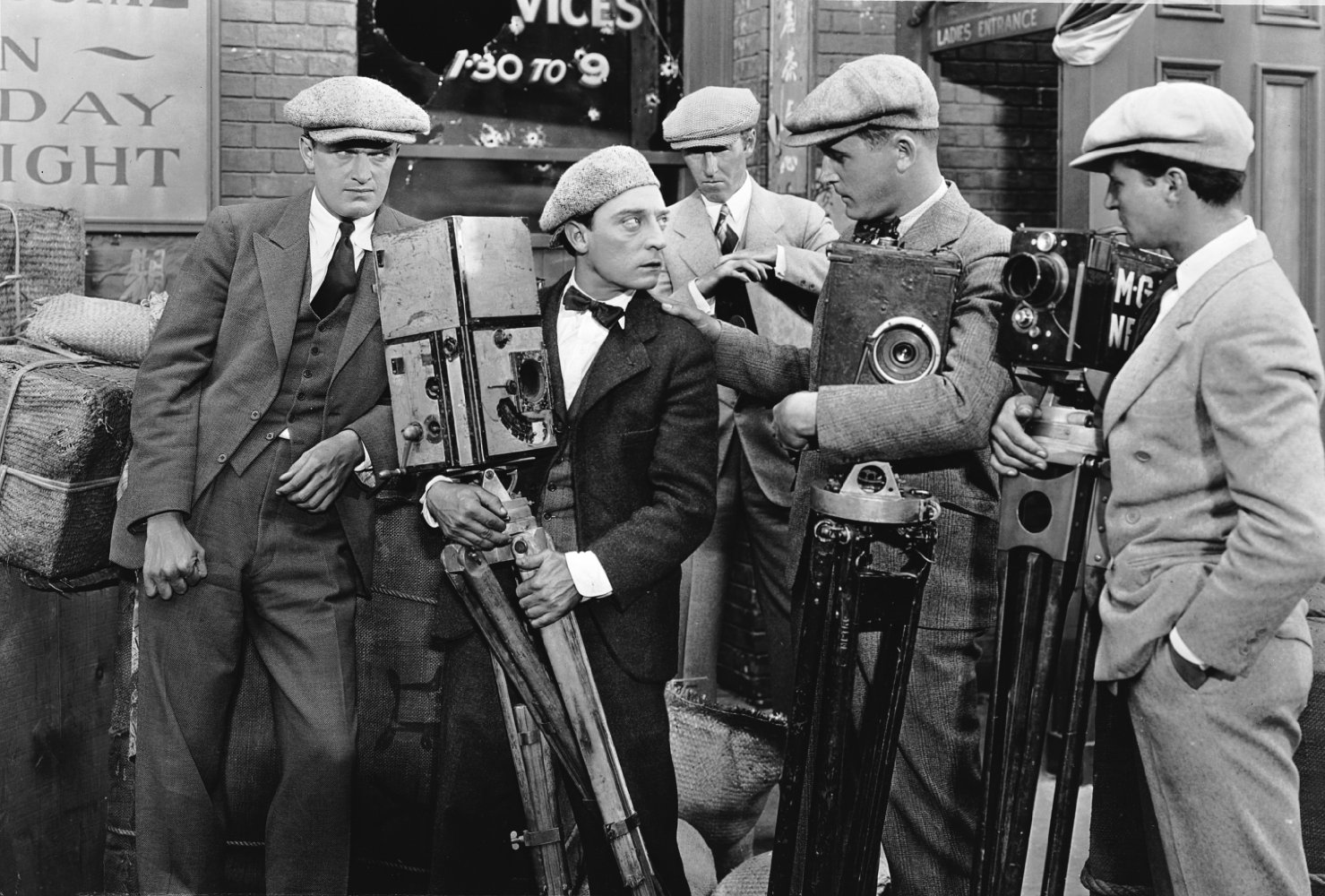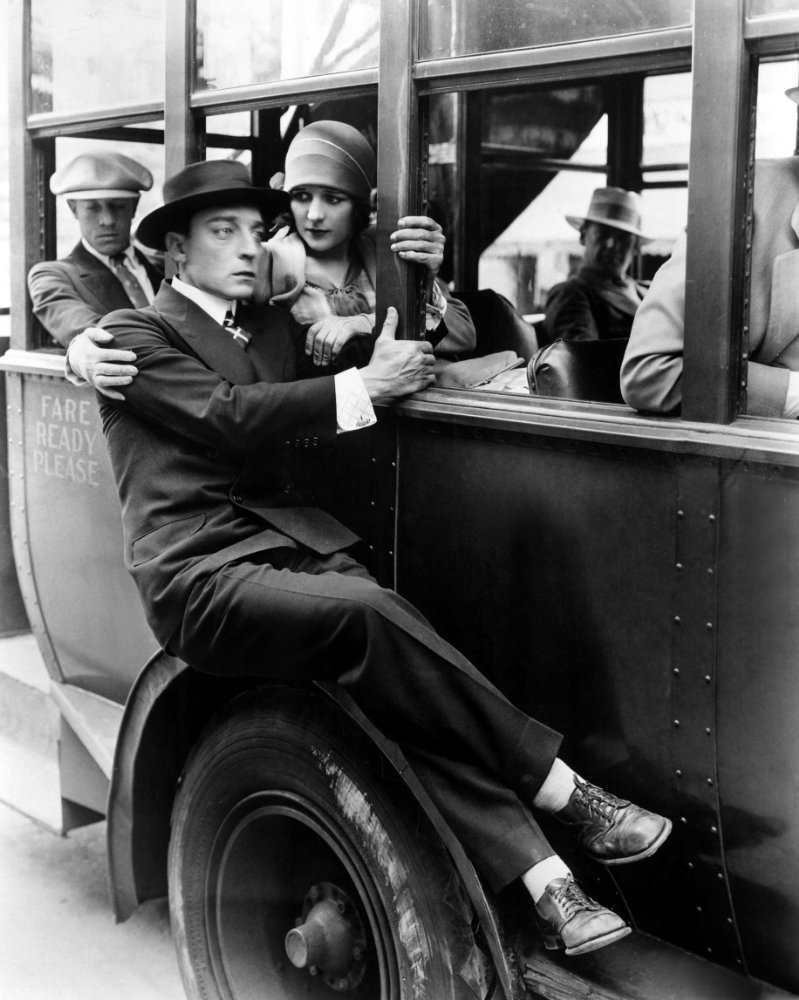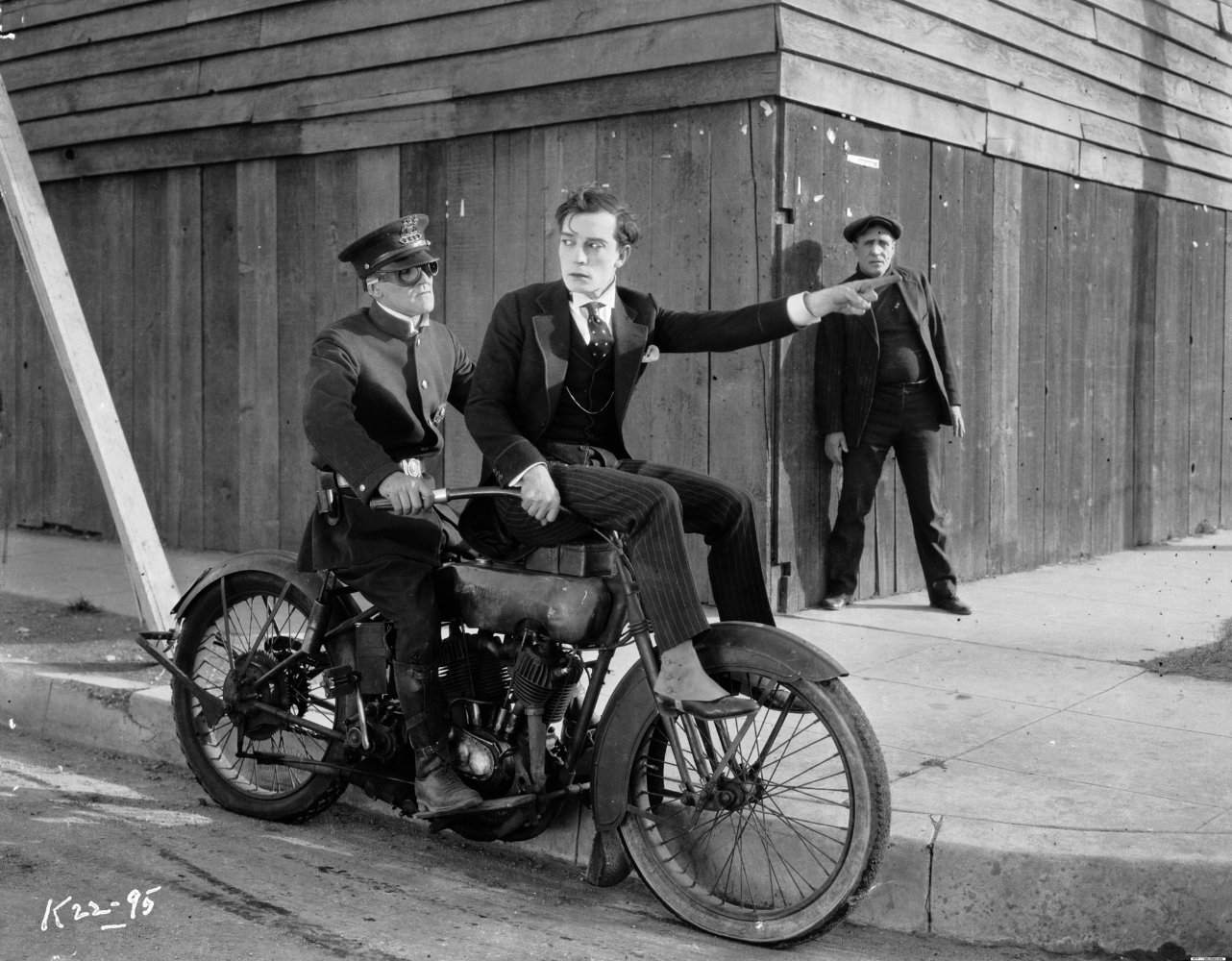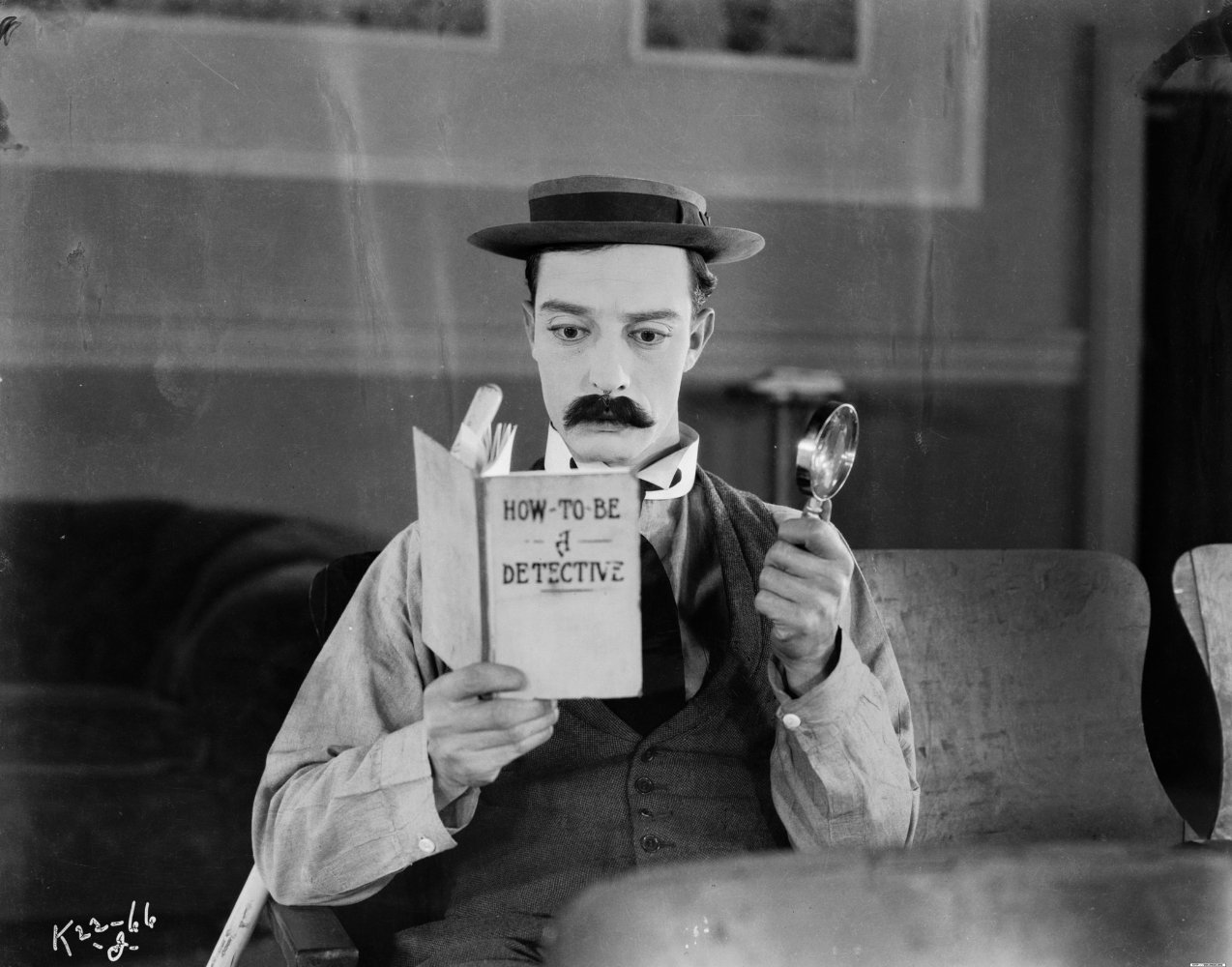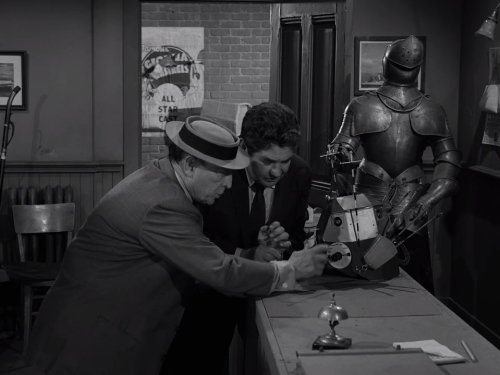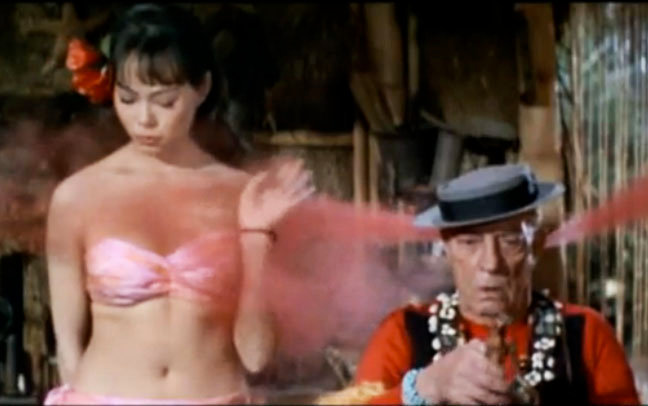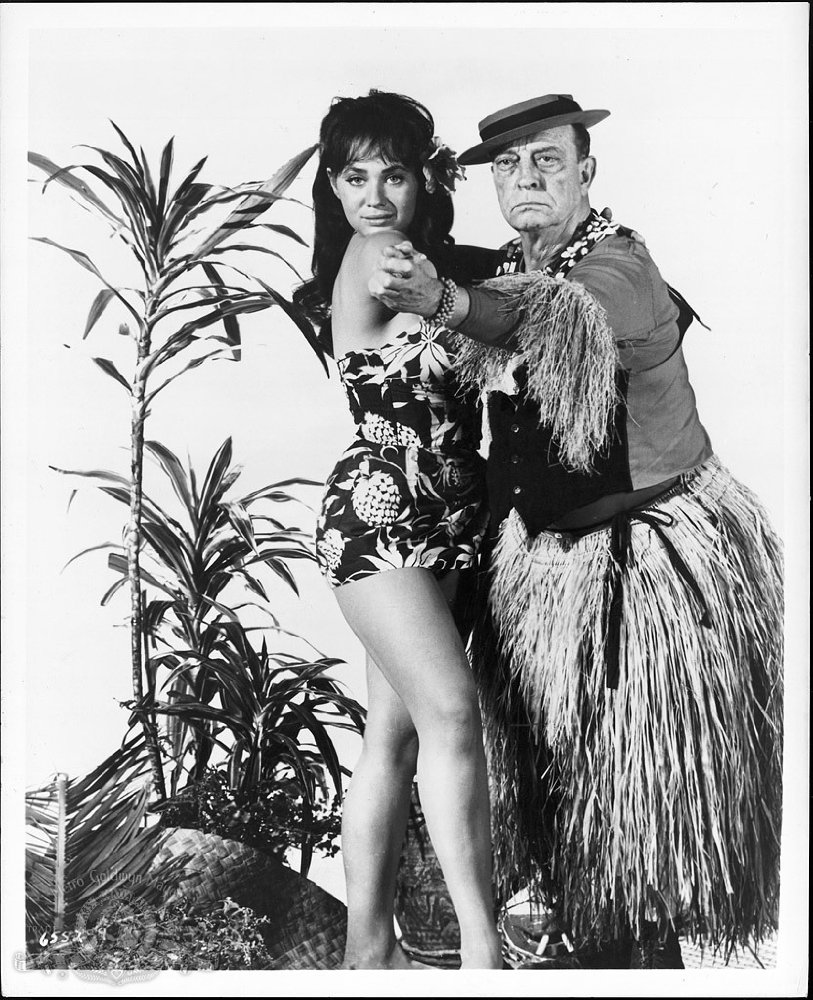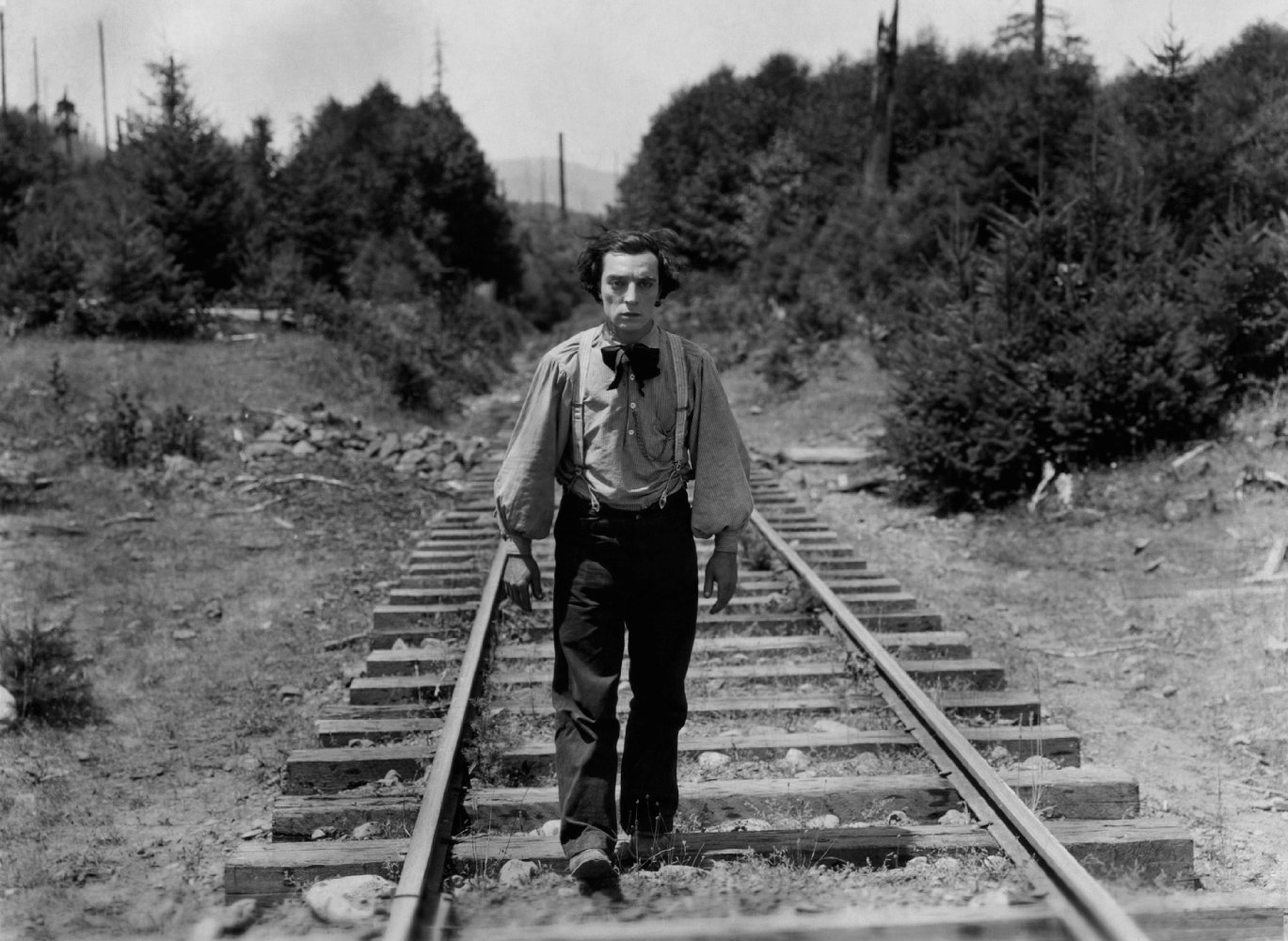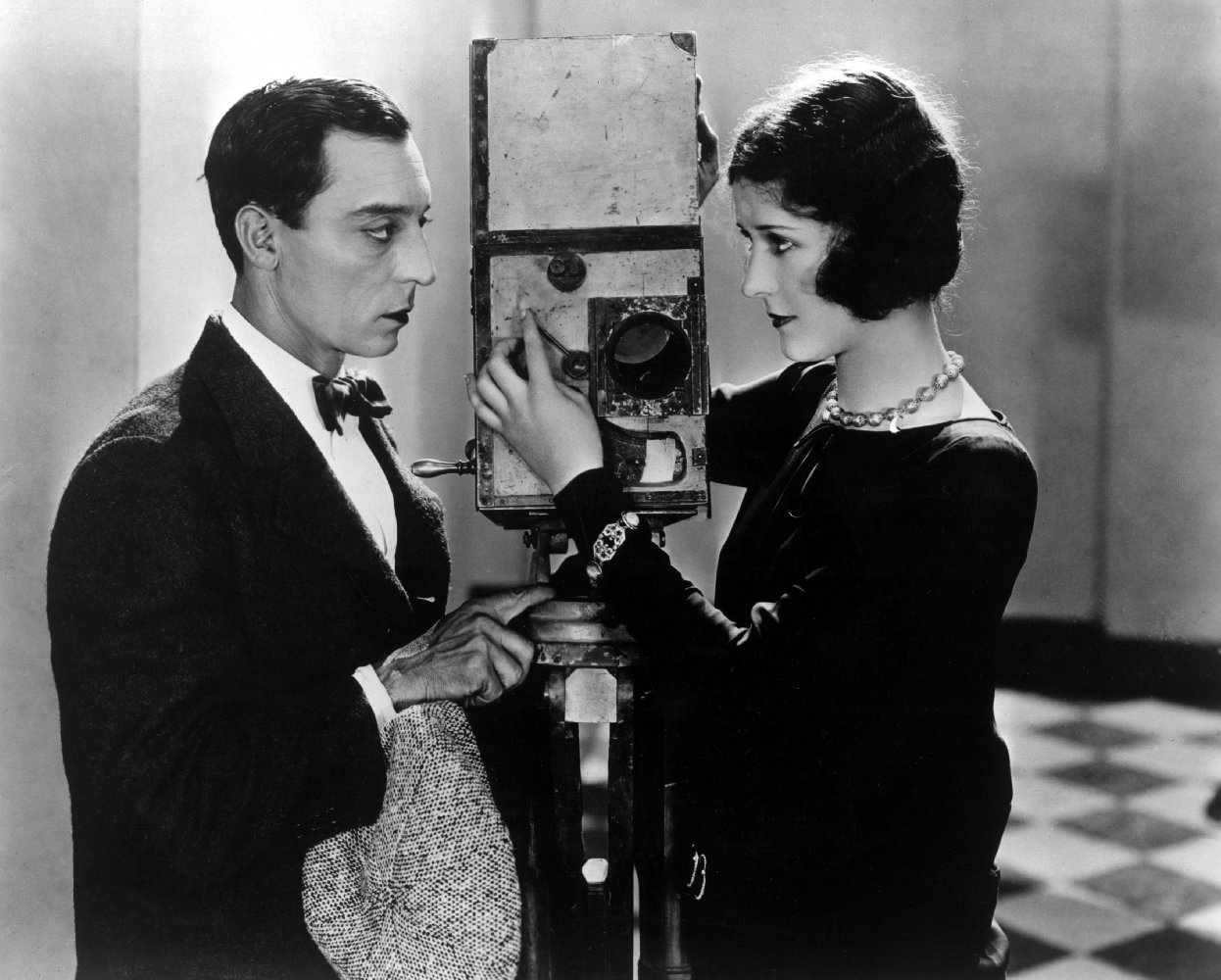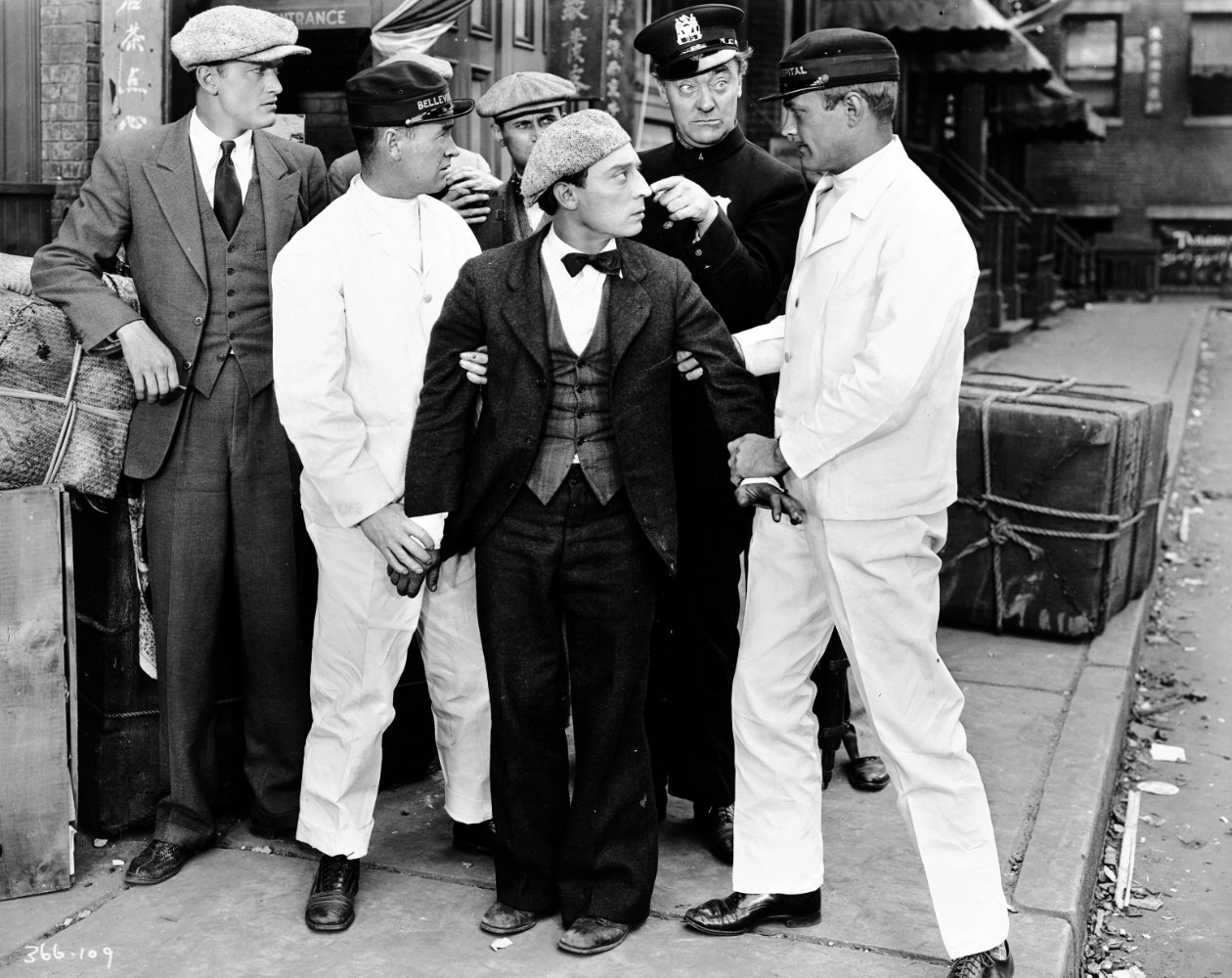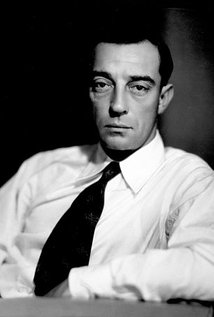
Buster Keaton
Birthday: 4 October 1895, Piqua, Kansas, USA
Birth Name: Joseph Frank Keaton
Height: 165 cm
Joseph Frank Keaton was born on October 4, 1895 in Piqua, Kansas, to Joe Keaton and Myra Keaton. Joe and Myra were Vaudevillian comedians with a popular, ever-changing variety act, giving Keaton an eclectic and interesting upbringing. In the earliest days on stage, they traveled with a medicine show that included family friend, illusionist Harry Ho...
Show more »
Joseph Frank Keaton was born on October 4, 1895 in Piqua, Kansas, to Joe Keaton and Myra Keaton. Joe and Myra were Vaudevillian comedians with a popular, ever-changing variety act, giving Keaton an eclectic and interesting upbringing. In the earliest days on stage, they traveled with a medicine show that included family friend, illusionist Harry Houdini. Keaton himself verified the origin of his nickname "Buster", given to him by Houdini, when at the age of three, fell down a flight of stairs and was picked up and dusted off by Houdini, who said to Keaton's father Joe, also nearby, that the fall was 'a buster'. Savvy showman Joe Keaton liked the nickname, which has stuck for more than 100 years.At the age of four, Keaton had already begun acting with his parents on the stage. Their act soon gained the reputation as one of the roughest in the country, for their wild, physical antics on stage. It was normal for Joe to throw Buster around the stage, participate in elaborate, dangerous stunts to the reverie of audiences. After several years on the Vaudeville circuit, "The Three Keatons", toured until Keaton had to break up the act due to his father's increasing alcohol dependence, making him a show business veteran by the age of 21.While in New York looking for work, a chance run-in with the wildly successful film star and director Roscoe 'Fatty' Arbuckle, resulted in Arbuckle inviting him to be in his upcoming short The Butcher Boy (1917), an appearance that launched Keaton's film career, and spawned a friendship that lasted until Arbuckle's sudden death in 1933. By 1920, after making several successful shorts together, Arbuckle moved on to features, and Keaton inherited his studio, allowing him the opportunity to begin producing his own films. By September 1921, tragedy touched Arbuckle's life by way of a scandal, where he was tried three times for the murder of Virginia Rapp. Although he was not guilty of the charges, and never convicted, he was unable to regain his status, and the viewing public would no longer tolerate his presence in film. Keaton stood by his friend and mentor through out the incident, supporting him financially, finding him directorial work, even risking his own budding reputation offering to testify on Arbuckle's behalf.In 1921, Keaton also married his first wife, Natalie Talmadge under unusual circumstance that have never been fully clarified. Popular conjecture states that he was encouraged by Joseph M. Schenck to marry into the powerful Talmadge dynasty, that he himself was already a part of. The union bore Keaton two sons. Keaton's independent shorts soon became too limiting for the growing star, and after a string of popular films like One Week (1920), The Boat (1921) and Cops (1922), Keaton made the transition into feature films. His first feature, Three Ages (1923), was produced similarly to his short films, and was the dawning of a new era in comedic cinema, where it became apparent to Keaton that he had to put more focus on the storylines and characterization.At the height of his popularity, he was making two features a year, and followed Ages with Our Hospitality (1923), The Navigator (1924) and The General (1926), the latter two he regarded as his best films. The most renown of Keaton's comedies is Sherlock Jr. (1924), which used cutting edge special effects that received mixed reviews as critics and audiences alike had never seen anything like it, and did not know what to make of it. Modern day film scholars liken the story and effects to Christopher Nolan Inception (2010), for its high level concept and ground-breaking execution. Keaton's Civil War epic The General (1926) kept up his momentum when he gave audiences the biggest and most expensive sequence ever seen in film at the time. At its climax, a bridge collapses while a train is passing over it, sending the train into a river. This wowed audiences, but did little for it's long-term financial success. Audiences did not respond well to the film, disliking the higher level of drama over comedy, and the main character being a Confederate soldier.After a few more silent features, including College (1927) and Steamboat Bill, Jr. (1928), Keaton was informed that his contract had been sold to MGM, by brother-in-law and producer Joseph M. Schenck. Keaton regarded the incident as the worst professional mistake he ever made, as it sent his career, legacy, and personal life into a vicious downward spiral for many years. His first film with MGM was The Cameraman (1928), which is regarded as one of his best silent comedies, but the release signified the loss of control Keaton would incur, never again regaining his film making independence. He made one more silent film at MGM entitled Spite Marriage (1929) before the sound era arrived.His first appearance in a film with sound was with the ensemble piece The Hollywood Revue of 1929 (1929), though despite the popularity of it and his previous MGM silents, MGM never allowed Keaton his own production unit, and increasingly reduced his creative control over his films. By 1932, his marriage to Natalie Talmadge had dissolved when she sued him for divorce, and in an effort to placate her, put up little resistance. This resulted in the loss of the home he would built for his family nicknamed "The Italian Villa", the bulk of his assets, and contact with his children. Natalie changed their last names from Keaton to Talmadge, and they were disaloud from speaking about their father or seeing him. About 10 years later, when they became of age, they rekindled the relationship with Keaton. His hardships in his professional and private life that had been slowly taking their tole, begun to culminate by the early 1930s resulting in his own dependence on alcohol, and sometimes violent and erratic behavior. Depressed, penniless, and out of control, he was fired by MGM by 1933, and became a full-fledged alcoholic.After spending time in hospitals to attempt and treat his alcoholism, he met second wife Mae Scrivens, a nurse, and married her hastily in Mexico, only to end in divorce by 1935. After his firing, he made several low-budget shorts for Educational Pictures, and spent the next several years of his life fading out of public favor, and finding work where he could. His career was slightly reinvigorated when he produced the short Grand Slam Opera (1936), which many of his fans admire for giving such a good performance during the most difficult and unmanageable years of his life.In 1940, he met and married his third wife Eleanor Norris, who was deeply devoted to him, and remained his constant companion and partner until Keaton's death. After several more years of hardship working as an uncredited, underpaid gag man for comedians such as the Marx Brothers, he was consulted on how to do a realistic and comedic fall for In the Good Old Summertime (1949) in which an expensive violin is destroyed. Finding no one who could do this better than him, he was given a minor role in the film. His presence reignited interest in his silent films, which lead to interviews, television appearances, film roles, and world tours that kept him busy for the rest of his life.After several more film, television, and stage appearances throughout the 1960s, he wrote the autobiography "My Wonderful World of Slapstick", having completed nearly 150 films in the span of his ground-breaking career. His last film appearance was A Funny Thing Happened on the Way to the Forum (1966) which premiered seven months after Keaton's death from the rapid onset of lung cancer. Since his death, Keaton's legacy is being discovered by new generations of viewers every day, many of his films are available on YouTube, DVD and Blu-ray, where he, like all gold-gilded and beloved entertainers can live forever. Show less «
[on the differences between his and Charles Chaplin's characters] Charlie's tramp was a bum with a b...Show more »
[on the differences between his and Charles Chaplin's characters] Charlie's tramp was a bum with a bum's philosophy. Lovable as he was, he would steal if he got the chance. My little fellow was a working man and honest. Show less «
They say pantomime's a lost art. It's never been a lost art and never will be, because it's too natu...Show more »
They say pantomime's a lost art. It's never been a lost art and never will be, because it's too natural to do. Show less «
I always want the audience to out-guess me, and then I double-cross them.
I always want the audience to out-guess me, and then I double-cross them.
Silence is of the gods; only monkeys chatter.
Silence is of the gods; only monkeys chatter.
Tragedy is a close-up; comedy, a long shot.
Tragedy is a close-up; comedy, a long shot.
Only things that one could imagine happening to real people, I guess, remain in a person's memory.
Only things that one could imagine happening to real people, I guess, remain in a person's memory.
Is Hollywood the cruelest city in the world? Well, it can be. New York can be like that, too. You ca...Show more »
Is Hollywood the cruelest city in the world? Well, it can be. New York can be like that, too. You can be a Broadway star here one night, and something happens, and then you're out--nobody knows you on the street. They forget you ever lived. It happens in Hollywood, too. Show less «
What used to get my goat at MGM were comedians like The Marx Brothers or [Bud Abbott] and [Lou Coste...Show more »
What used to get my goat at MGM were comedians like The Marx Brothers or [Bud Abbott] and [Lou Costello], who never worried about the script or the next scene. My God, we ate, slept and dreamed our pictures. Show less «
[on his time working as an uncredited gag writer for The Marx Brothers at MGM] It was an event when ...Show more »
[on his time working as an uncredited gag writer for The Marx Brothers at MGM] It was an event when you could get all three of them on the set at the same time. The minute you started a picture with the Marx Brothers you hired three assistant directors, one for each Marx brother. You had two of 'em while you went to look for the third one and the first two would disappear. Show less «
Pop made me the featured performer of our act when I was five. There were dozens of other family act...Show more »
Pop made me the featured performer of our act when I was five. There were dozens of other family acts in vaudeville at the turn of the century, but none of the children in them was featured as early as that. Many of those kids were very talented, and their parents were as eager as mine to give them the same head start in show business that I was getting. The reason managers approved of my being featured was because I was unique, being at that time the only little hell-raising Huck Finn type boy in vaudeville. The parents of the others presented their boys as cute and charming Little Lord Fauntleroys. The girls were Dolly Dimples types with long, golden curls. I doubt that any kid actor had more attempts made to save him [by civic do-gooders] than did our Little Buster. The reason of course was our slam-bang act. Even people who most enjoyed our work marvelled when I was able to get up after my bashing, crashing, smashing sessions with pop. Show less «
I've had few dull moments [in my life] and not too many sad and defeated ones. In saying this, I am ...Show more »
I've had few dull moments [in my life] and not too many sad and defeated ones. In saying this, I am by no means overlooking the rough and rocky years I've lived through. But I was not brought up thinking life would be easy. I always expected to work hard for my money and to get nothing I did not earn. And the bad years, it seems to me, were so few that only a dyed-in-the-wool grouch who enjoys feeling sorry for himself would complain. Show less «
[on why he did all his own stunts] Stuntmen don't get laughs.
[on why he did all his own stunts] Stuntmen don't get laughs.
Not long ago, a friend asked me what was the greatest pleasure I got from spending my whole life as ...Show more »
Not long ago, a friend asked me what was the greatest pleasure I got from spending my whole life as an actor. There have been so many that I had to think about that for a moment. Then I said, "Like everyone else, I like to be with a happy crowd.". Show less «
Dumb show is best for screen people, if they must appear in public.
Dumb show is best for screen people, if they must appear in public.
I gotta do some sad scenes. Why, I never tried to make anybody cry in my life! And I go 'round all t...Show more »
I gotta do some sad scenes. Why, I never tried to make anybody cry in my life! And I go 'round all the time dolled up in kippie clothes--wear everything but a corset . . . can't stub my toe in this picture nor anything! Just imagine having to play-act all the time without ever getting hit with anything! Show less «
No man can be a genius in slapshoes and a flat hat.
No man can be a genius in slapshoes and a flat hat.
Railroads are a great prop. You can do some awful wild things with railroads.
Railroads are a great prop. You can do some awful wild things with railroads.
When I've got a gag that spreads out, I hate to jump a camera into close-ups. So I do everything in ...Show more »
When I've got a gag that spreads out, I hate to jump a camera into close-ups. So I do everything in the world I can to hold it in that long-shot and keep the action rolling. Close-ups are too jarring on the screen, and this type of cut can stop an audience from laughing. Show less «
All my life, I have been happiest when the folks watching me said to each other, "Look at the poor d...Show more »
All my life, I have been happiest when the folks watching me said to each other, "Look at the poor dope, will ya?". Show less «
[on the advent of sound in the movies] In every picture it got tougher. They'd laugh their heads off...Show more »
[on the advent of sound in the movies] In every picture it got tougher. They'd laugh their heads off at dialogue written by all your new writers. They were joke-happy. They didn't look for action; they were looking for funny things to say. Show less «
[Asked by a reporter at an MGM premiere, "Are you happy to be here?"] Of course, I got off location ...Show more »
[Asked by a reporter at an MGM premiere, "Are you happy to be here?"] Of course, I got off location for this! Show less «
Think slow, act fast.
Think slow, act fast.
The first thing I did in the studio was to want to tear that camera to pieces. I had to know how tha...Show more »
The first thing I did in the studio was to want to tear that camera to pieces. I had to know how that film got into the cutting room, what you did to it in there, how you projected it, how you finally got the picture together, how you made things match. The technical part of pictures is what interested me. Material was the last thing in the world I thought about. You only had to turn me loose on the set and I'd have material in two minutes, because I'd been doing it all my life. Show less «
A comedian does funny things. A good comedian does things funny.
A comedian does funny things. A good comedian does things funny.
Half of our scenes, for God's sakes, we only just talked over. We didn't actually get out there and ...Show more »
Half of our scenes, for God's sakes, we only just talked over. We didn't actually get out there and rehearse 'em. We would just walk through it and talk about it. We crank that first rehearsal. Because any thing can happen--and generally did . . . We used the rehearsal scenes instead of the second take. Show less «
Buster Keaton's FILMOGRAPHY
HD
Annabelle: Creation
IMDb: 7
2017
109 min
Country: United States
Genre: Thriller, Horror, Mystery
Twelve years after the tragic death of their little girl, a dollmaker and his wife welcome a nun and several girls from a shuttered orphanage into ...

